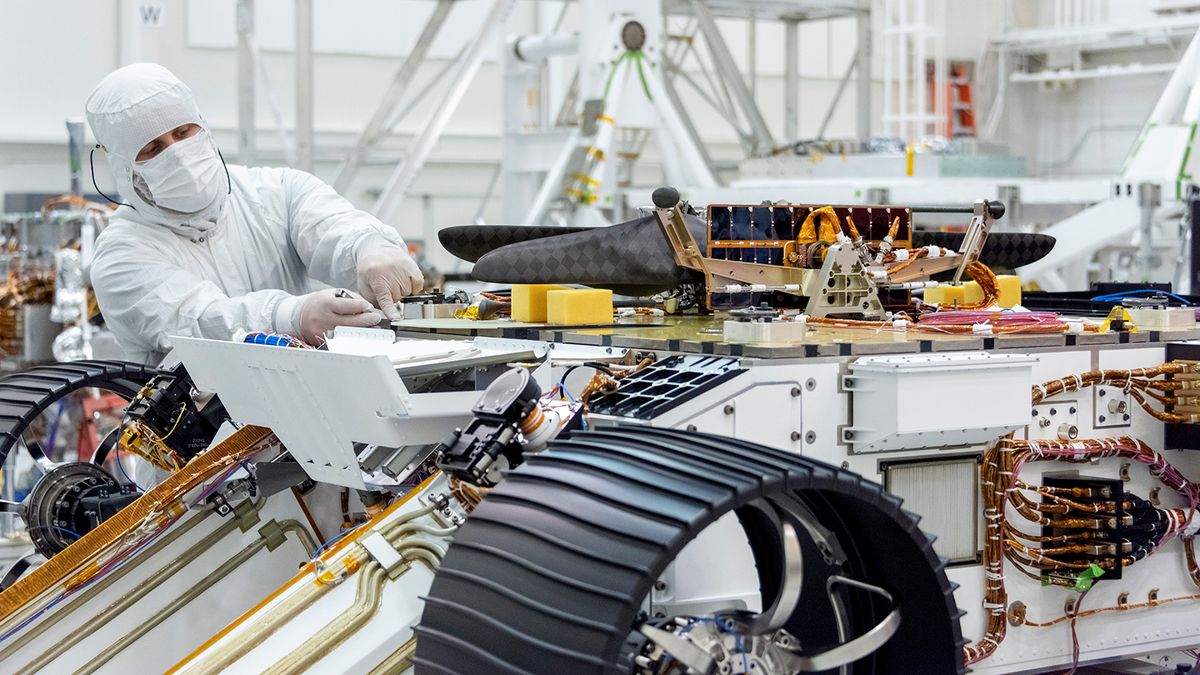
The first-ever off-Earth helicopter just hooked up with its traveling companion.
Engineers at NASA's Jet Propulsion Laboratory (JPL) in Pasadena, California, attached the tiny Mars Helicopter to the agency's car-size Mars 2020 rover today (Aug. 28), agency officials announced.
The duo will launch together in July 2020 and touch down inside the Red Planet's Jezero Crater in February 2021. Once on Mars, the solar-powered, 4-lb. (1.8 kilograms) helicopter will detach and begin flying test sorties.
Related: NASA's Mars Rover 2020 Mission in Pictures (Gallery)
"Our job is to prove that autonomous, controlled flight can be executed in the extremely thin Martian atmosphere," Mars Helicopter project manager, of JPL, said in a statement. (Mars' air is just 1% as dense as that of Earth at sea level.)
"Since our helicopter is designed as a flight test of experimental technology, it carries no science instruments," she added. "But if we prove powered flight on Mars can work, we look forward to the day when Mars helicopters can play an important role in future explorations of the Red Planet."
For example, helicopters could serve as scouts for robots or human pioneers on Mars. Red Planet rotorcraft could also carry instruments and conduct a variety of science work of their own, NASA officials have said.
Mas 2020, which will soon get a catchier moniker via a student naming competition, will hunt for signs of long-dead Red Planet life in Jezero Crater, which hosted a river delta in the ancient past. The rover will also characterize the site's geology, collect and cache samples for future return to Earth and demonstrate gear that will generate oxygen from the carbon-dioxide-dominated Martian air, among other tasks.
"With this joining of two great spacecraft, I can say definitively that all the pieces are in place for a historic mission of exploration," Thomas Zurbuchen, associate administrator of the Science Mission Directorate at NASA's headquarters in Washington, D.C, said in the same statement. "Together, Mars 2020 and the Mars Helicopter will help define the future of science and exploration of the Red Planet for decades to come."
NASA plans to launch another rotorcraft soon as well — Dragonfly, which will soar through the thick atmosphere of Saturn's huge moon Titan. The life-hunting Dragonfly is scheduled to lift off in 2026 and land on Titan's frigid surface in 2034.
Mike Wall's book about the search for alien life, "Out There" (Grand Central Publishing, 2018; illustrated by Karl Tate), is out now. Follow him on Twitter @michaeldwall. Follow us on Twitter @Spacedotcom or Facebook.
https://www.space.com/mars-helicopter-drone-installed-nasa-2020-rover.html
2019-08-29 11:12:00Z
52780366902001
Tidak ada komentar:
Posting Komentar